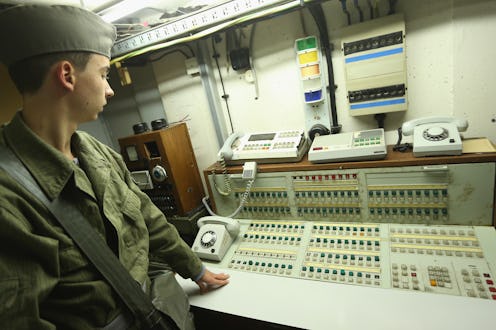News
A Russian Spy? What Is This, The Cold War?
As the city braced for a snowstorm of colossal proportions on Monday, federal agents revealed that they were were occupied with non-weather related business — the FBI arrested an alleged Russian spy in New York City who posed as a Manhattan banker, according to federal officials. Identified in a criminal complaint unsealed on Monday as Evgeny Buryakov, the, um, Russian spy is accused of being in cahoots with the agents of Russia’s foreign intelligence service, the SVR — formerly known as the notoriously infamous KGB — as a “non-official cover” agent, reported ABC News.
But Buryakov's arrest is only part of a larger Russian spy ring involving two other individuals, Victor Podobnyy and Igor Sporyshev, that the FBI uncovered. According to the complaint, Sporyshev acted as a trade representative to Russia in New York, and Podobnyy was allegedly an attaché to the permanent mission of the Russian Federation to the United Nations. All three men, along with others who were unnamed in the complaint, were purportedly instructed to gather intelligence on potential U.S. sanctions against Russia, and on U.S. efforts to develop alternative energy resources.
Unfortunately for Buryakov, as a "non-official cover" (NOC) agent, the diplomatic immunity that allowed Podobnyy and Sporyshev to avoid arrest and leave the country was not extended to him. ABC News reported that a court document charging Buryakov of spying activities detailed:
In many cases [NOCs] are never identified as intelligence agents by the host government. As a result, a NOC is an extremely valuable intelligence asset for the SVR.
If you've suddenly had a sense of déjà vu, you're not alone. The "Russian spy" trope seems like a #tbt to the Cold War era, when the U.S. and U.S.S.R. — as Soviet Russia was known then — spent large amounts of money and effort to recruit, train, and deploy spies around the world in a bid to gain the upper hand in a bitter struggle of nuclear weapons and political ideology.
Mark Stout, a former CIA analyst, told ABC News that the tradecraft — techniques used in modern espionage and general intelligence activity — detailed in the criminal complaint seemed straight out of the Cold War.
This is really a classic case of espionage, I think, in terms of how it was conducted both on the Russian side as well as on the FBI side. The FBI is very good at this. I would not run up against the FBI trying to run an espionage operation in the United States.
The arrest is years in the making, as the FBI began tracking the trio after the arrests of Anna Chapman and nine other spies in 2010, the largest spy ring bust in the country after the fall of communism. The complaint said that the men were suspected of trying to recruit female spies for Russia.
U.S. Attorney General Eric Holder, U.S. Attorney Preet Bharara, and FBI officials announced the case on Monday. The Russian Foreign Ministry and the Foreign Intelligence Service could not be reached by the Associated Press for comment, though Alexey Zaytsev, spokesman for Russia's U.N. Mission, said, evasively:
We don't have any comment now.
Image: Getty Images (2)
